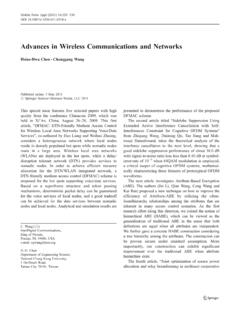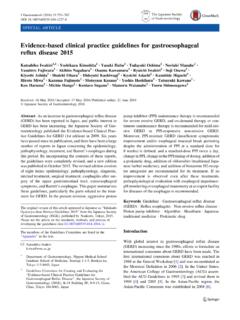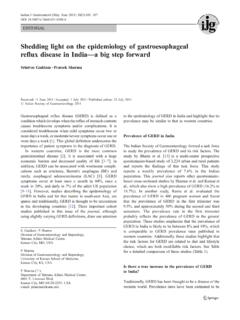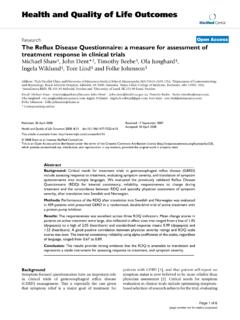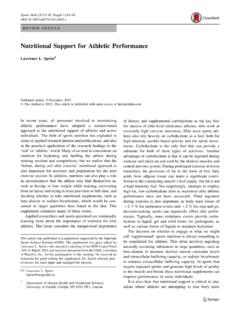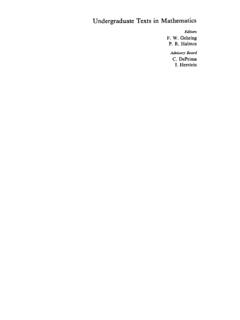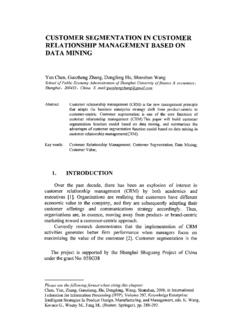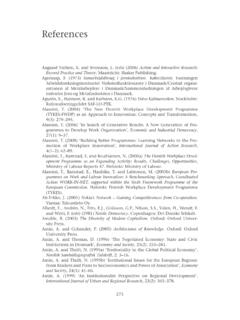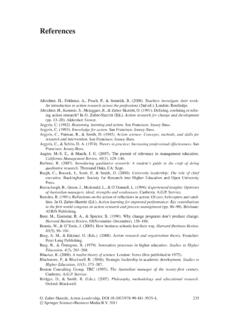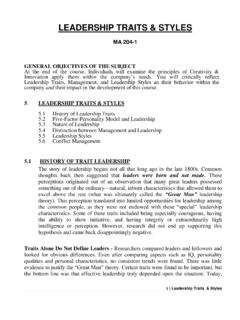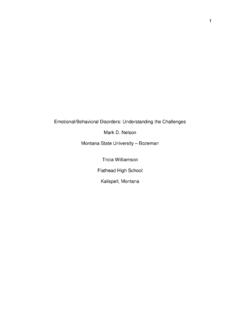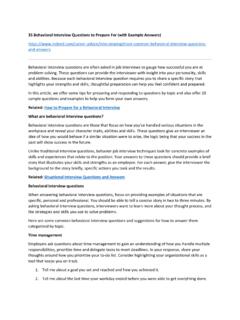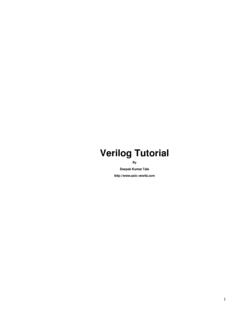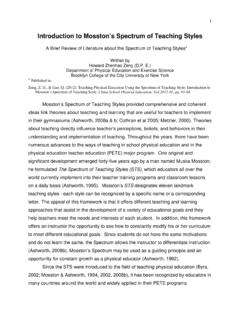Transcription of Parenting Styles: A Closer Look at a Well-Known Concept
1 Journal of Child and Family Studies (2019) 28:168 181 PAPERP arenting styles : A Closer look at a Well-Known ConceptSofie Kuppens1,2 Eva Ceulemans3 Published online: 18 September 2018 The Author(s) 2018 AbstractAlthough Parenting styles constitute a Well-Known Concept in Parenting research, two issues have largely been overlooked inexisting studies. In particular, the psychological control dimension has rarely been explicitly modelled and there is limited insightinto joint Parenting styles that simultaneously characterize maternal and paternal practices and their impact on childdevelopment.
2 Using data from a sample of 600 Flemish families raising an 8-to-10 year old child, we identified naturallyoccurring joint Parenting styles . A cluster analysis based on two Parenting dimensions (parental support and behavioral control)revealed four congruent Parenting styles : an authoritative, positive authoritative, authoritarian and uninvolved Parenting style. Asubsequent cluster analysis comprising three Parenting dimensions (parental support, behavioral and psychological control)yielded similar cluster profiles for the congruent (positive) authoritative and authoritarian Parenting styles , while the fourthparenting style was relabeled as a congruent intrusive Parenting style.
3 ANOVAs demonstrated that having (positive) authoritativeparents associated with the most favorable outcomes, while having authoritarian parents coincided with the least favorableoutcomes. Although less pronounced than for the authoritarian style, having intrusive parents also associated with poorer childoutcomes. Results demonstrated that accounting for parental psychological control did not yield additional Parenting styles , butenhanced our understanding of the pattern among the three Parenting dimensions within each Parenting style and theirassociation with child outcomes.
4 More similarities than dissimilarities in the Parenting of both parents emerged, although addingpsychological control slightly enlarged the differences between the scores of mothers and styles Cluster analysis Psychological control Psychosocial outcomes School-aged childrenParenting has gained ample research attention from variousscientific disciplines. Many theoretical frameworksemphasize that Parenting plays a vital role in child devel-opment, which has fueled research investigating the impactof Parenting on child development for over 75 years.
5 Whenstudying Parenting , researchers can take various strategiesby considering Parenting practices, Parenting dimensions orparenting styles . Parenting practices can be defined asdirectly observable specific behaviors that parents use tosocialize their children (Darling and Steinberg1993). Forexample, Parenting practices intended to promote academicachievement are showing involvement by attendingparent teacher meetings or regular supervision of children shomework. Other Parenting practices pertain to positivereinforcement, discipline, or problem than focusing on specific Parenting practices,other researchers have identified overarching parentingdimensions that reflect similar Parenting practices, mostlyby modeling the relationships among these Parenting prac-tices using factor analytic techniques.
6 There is consensusamong scientists about the existence of at least two broaddimensions of Parenting , labeled parental support and par-ental control. Parental support pertains to the affectivenature of the parent-child relationship, indicated by showinginvolvement, acceptance, emotional availability, warmth,and responsivity (Cummings et ). Support has beenrelated to positive development outcomes in children, suchas the prevention of alcohol abuse and deviance (Barnes andFarrell1992), depression and delinquency (Bean et ) and externalizing problem behavior (Shaw et ).
7 *Sofie School of Health Policy & Management, ErasmusUniversity Rotterdam, Rotterdam, The Netherlands2 Department of Public Health and Primary Care, KU Leuven,Leuven, Belgium3 Faculty of Psychology and Educational Sciences, KU Leuven,Leuven, Belgium1234567890();,:1234567890();,:The control dimension has been subdivided into psy-chological and behavioral control (Barber1996; Schaefer1965; Steinberg1990). Parental behavioral control consistsof Parenting behavior that attempts to control, manage orregulate child behavior, either through enforcing demandsand rules, disciplinary strategies, control of rewards andpunishment, or through supervisory functions (Barber2002;Maccoby1990; Steinberg1990).
8 An appropriate amount ofbehavioral control has been considered to positively affectchild development, whereas insufficient ( , poor parentalmonitoring) or excessive behavioral control ( , parentalphysical punishment) has been commonly associated withnegative child developmental outcomes, such as deviantbehavior, misconduct, depression and anxious affect ( ,Barnes and Farrell1992; Coie and Dodge1998; Galamboset ; Patterson et ). While parental behavioralcontrol refers to control over the child s behavior, parentalpsychological control pertains to an intrusive type of controlin which parents attempt to manipulate children s thoughts,emotions, and feelings (Barber1996; Barber et ).
9 Due to its manipulative and intrusive nature, psychologicalcontrol has almost exclusively been associated with negativedevelopmental outcomes in children and adolescents, suchas depression, antisocial behaviour and relational regression( , Barber and Harmon2002; Barber et ; Kuppenset ). The three Parenting dimensions (support, psy-chological control, and behavioral control) have beenlabelled conceptually distinct, although they are related tosome extent (Barber et ; Soenens et ).Other authors have taken yet a different approach tostudying Parenting by emphasizing that specific combina-tions of Parenting practices within a parent particularlyimpact child development rather than separate parentingpractices or dimensions ( , Baumrind1991; Maccoby andMartin1983).
10 Within such a configurational approach, oneexamines which patterns of Parenting practices occur withinthe same parent and how these patterns commonly labelledas Parenting styles are related to children s Parenting styles have the clear advantage of accountingfor different Parenting practices at the same time within thesame person. As such, it comprises a person centeredapproach that focuses on configurations within individualsrather than a variable centered approach that focuses onrelationships among variables across individuals as has beenused to identify Parenting dimensions (Magnusson1998).
